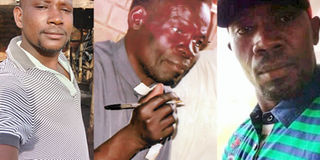Families of Ugandans killed in South Sudan wallow in poverty

LEFT - RIGHT: Abasi Nsubuga, Rev Yona Gboro, Emmanuel Sserwada
What you need to know:
Many orphans have since dropped out of school for lack of fees since their killed parents were the sole breadwinners.
June 8, 2017, was just like any other ordinary day when retired Rev Yona Gboro woke up at 5am to prepare for his journey to South Sudan to attend a traditional marriage.
He bid farewell to his family in anticipation that the day would be a success.
In the company of other colleagues, they left for South Sudan capital Juba via Nimule.
About 12kms from Nimule, they were attacked by a group of armed men suspected to be members of National Salvation Front (NAS), a rebel outfit.
Born on June 14, 1943 in Longira Village, Aliribu Parish in Lobule Sub-county in Koboko District, Rev Yona was killed six days after celebrating his 74th birthday.
Six years after the demise of the dedicated servant of God, life has not been the same for his family since he was the sole breadwinner.
Due to the volatile security situation, several Ugandans, mainly drivers, who ply the route to South Sudan to fend for their families, have lost their lives.
This newspaper visited some of the families of those who were killed in South Sudan, some of which are living in deplorable conditions. Some orphans have since dropped out of school, and the widows on the other hand are financially handicapped to fend for their children.
“Two of my sisters got married because we could not sustain them in school, although they have already quit their marriages,” Mr Milton Yosaki, Rev Gboro’s eldest son, told Daily Monitor early this week.
Mr Yosaki said his father’s death left a huge gap that he is struggling to fill since his meagre earnings can hardly cater for the family.
“I currently work in a private institution and my monthly income is Shs180,000. I have nine dependents and I must provide them medical care, feeding and other basic needs. Our father was everything to us,” he said.
Noah Sadam, a Ugandan driver from Nyai Parish, Abuku Sub-county in Koboko District, was killed on March 28, 2021, at Lanya County on the Yei-Juba highway.
He was killed together with Stephen Amati, Abugo Dada and Sonny Ali. Life became difficult for Ms Vilola Sida, Amati’s widow since she does not have the capacity to look after the family. She has since abandoned her late husband’s home with her child.
“I wish the government could come to my aid so that the child can have an opportunity to access education. Feeding alone is a problem and the worst bit of it is when the child falls sick,” she said.
Mr Moses Anguzu, a brother of the late Amati, said Ms Sida got married to another man. Mr Anguzu is now taking care of the three orphans.
However, Mr Siraji Ahmed Remo, the vice chairperson of Koboko Taxi Operators and Drivers Association, said their colleagues’ killing has not deterred them from working in South Sudan.
“Our appeal to the governments of Uganda and that of South Sudan is to look for ways to ensure the rebels are eliminated because we are losing people along the road.”
The Koboko District chairperson, Mr Asirafu Mambu, said he is dismayed by the laxity to compensate families of those who were killed or lost property.
The Maracha District chairperson, Mr Stephen Obitre, said “The compensation list for the people from West Nile has continued to grow from [Joseph] Kony’s [Lord’s Resistance Army] war victims to the West Nile Bank Front and those who lost lives and property during the South Sudan war,” he said.
The liaison officer for the Central Equatorial State in South Sudan, Capt Oliver Duku, could neither deny nor confirm the killing of Ugandans in South Sudan as he demanded for some time to have more consultations.
Why South Sudan
South Sudan had turned into a lucrative place for business that attracted traders from Ethiopia, Uganda, Eritrea, Kenya and DR Congo after signing of the Comprehensive Peace Agreement (CPA) in 2005.




